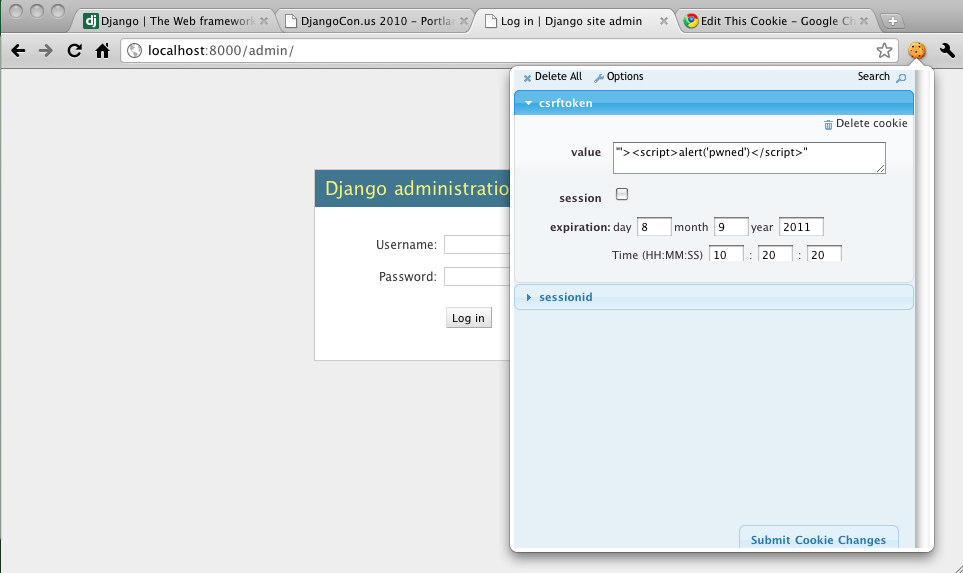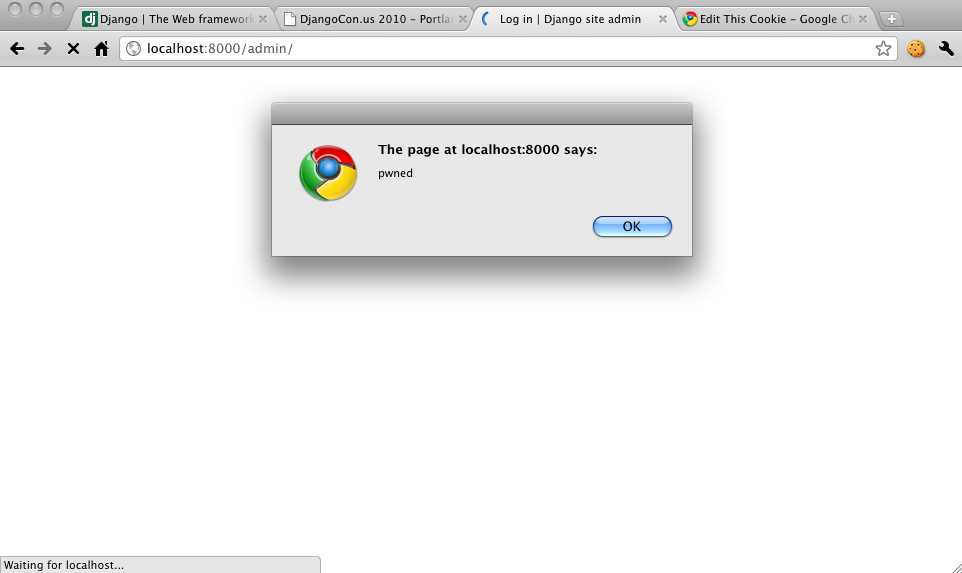More live-ish blogging…
The keynote
Eric Florenzano’s talk Why Django Sucks, and How We Can Fix It (slides) builds on top of the 2008 keynote by Cal Henderson entitled Why I Hate Django by pointing out instances where Django can improve. Like Cal, Eric complained about some things — some of which may not be solvable — and hopefully like some of the things Cal complained about they’ll get fixed. The note about needing more contributors again came up. Becoming a core developer is pretty much impossible. He complained about the reusability of apps citing django-avatar as an example. By rigidly defining a model, a “reusable app” becomes somewhat locked and cannot easily store new metadata. I really liked the concept of lazy foreign keys.
I’m somewhat torn on the idea of just switching Django’s source to github. I don’t fully buy Russell’s argument that you can just checkin to github and it will trigger to subversion. While that is a true statement, by having mirrors in bitbucket, launchpad and github, the Django core has fractioned the social aspects of those services. User comments are going to be split between between those services rather than being concentrated. However, similar to how Django used to allow comments in the documentation, these comments may not be that useful. I also think removing the Django admin from Django would be a travesty.
Django Security
Adam Baldwin’s Pony Pwning (notes, slides) was a decent hundred foot overview of Django security and web security in general. I would have really liked to see more details although it looked like some security vulnerability he found was redacted from his slides to give the Django developers time to fix it. Other than that, he said that the Django community as a whole “gets” security (I generally agree) and that while Django is fairly secure by default developers still manage to make mistakes. He did point out that there is no clickjacking protection for the admin and using X-FRAME-OPTIONS would be a good addition. Also, it seems that Django’s escaping could be improved. I liked that he pushed pen testing with w3af and running a web app firewall like mod_security. While frameworks can buy a certain level of security cheaply since it’s unlikely that a single developer or group will get everything right and it’s more likely that a well thought through framework will be more secure. However, then problems in the framework are discovered and basically all sites using it are suddenly vulnerable. I think some security researcher really just needs to spend some time with Django and really push the limits of its security model. I’ve talked about doing it at work, but buyin will be tough.
Other Stuff
Andrew Godwin’s (the developer of South) talk Step Away From That Database (slides – pdf) was the hundred foot overview of the various data stores for Django. One interesting trend that I’m picking up on is that Django developers seem to dislike MySQL a lot and Postgres is preferred by far. This might have something to do with MySQL development stalling and getting forked into Drizzle.
I enjoyed, but don’t entirely agree with Malcolm Tredinnick’s Modeling challenges (data) which seemed to be more about how to model complex data into Django’s models but in reality could have very well left out Django entirely and focused on databases and data modeling. I really liked the part about modeling dates that have different precisions. However, I am less sold on his implementation of modeling sports teams and players from data retrieved from retrosheet.
1 2 3 4 5 6 7 8 9 10 11 12 13 14 15 16 17 18 19 20 21 22 23 24 25 26 27 28 |
class Membership(models.Model): """ A specification of belonging to something for a period of time. Concrete base classes with supply the "somethings". """ joined = models.DateField() departed = models.DateField(null=True, blank=True) class Meta: abstract = True def _to_string(self, lhs, rhs): pairing = u"%s - %s" % (lhs, rhs) if self.departed: return u"%s (%s - %s)" % (pairing, self.joined.strftime("%d %b %Y"), self.departed.strftime("%d %b %Y")) return u"%s (%s - )" % (pairing, self.joined.strftime("%d %b %Y")) class TeamMember(Membership): team = models.ForeignKey(Team, related_name="members") person = models.ForeignKey(Person) role = models.CharField(max_length=2, choices=((COACH, "coach"), (PLAYER, "player"))) def __unicode__(self): return self._to_string(self.team, self.person) |
While this will result in fairly normalized data form data that looks like “keara001″,”Austin Kearns” where 001 is Kearns’ first season and gets incremented yearly. Basically, this easily allows you to join data easily and find all the history of where a player was and is, but it doesn’t take into account seasons very well. I think retrosheet does it the way they do so that you can easily get a player’s stats for a given year. It’s a complicated problem but I’ve seen retrosheet’s solution in many places.
Django add-ons
I think the best talk of the day so far (it JUST finished) was Eric Holscher’s Large Problems in Django, Mostly Solved (slides) which basically gives the hundred foot overview of the add-ons available and the external packages you should be using. Some stuff is pretty clear like pip, south, celery, fabric and sphinx, but on top of that there were packages that I hadn’t heard of or knew relatively little about like Haystack for search and Gunicorn for easy or simple deployments (it also might be the right solution for an easy Pythonic Hudson replacement). I was interested that Eric sees that Piston is in competition with Tastypie and that django-tagging is being overtaken by django-taggit. At work, we setup django-tagging but since then it seems that django-taggit has emerged since then. I also loved Eric’s metric of lines of docs and lines of tests as a metric of how good a project is.
Themes
- djangopackages.com is the new place to go for Django add-ons.
- 1.3 will probably have some good logging stuff built-in

